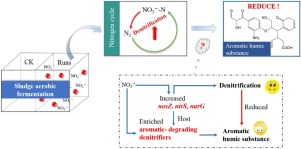当前位置:
X-MOL 学术
›
J. Hazard. Mater.
›
论文详情
Our official English website, www.x-mol.net, welcomes your feedback! (Note: you will need to create a separate account there.)
Elucidating the negative effect of denitrification on aromatic humic substance formation during sludge aerobic fermentation.
Journal of Hazardous Materials ( IF 13.6 ) Pub Date : 2020-01-13 , DOI: 10.1016/j.jhazmat.2020.122086 Mingzi Shi 1 , Xinyu Zhao 2 , Longji Zhu 1 , Junqiu Wu 1 , Taha Ahmed Mohamed 3 , Xu Zhang 1 , Xiaomeng Chen 1 , Yue Zhao 1 , Zimin Wei 1
Journal of Hazardous Materials ( IF 13.6 ) Pub Date : 2020-01-13 , DOI: 10.1016/j.jhazmat.2020.122086 Mingzi Shi 1 , Xinyu Zhao 2 , Longji Zhu 1 , Junqiu Wu 1 , Taha Ahmed Mohamed 3 , Xu Zhang 1 , Xiaomeng Chen 1 , Yue Zhao 1 , Zimin Wei 1
Affiliation

|
Humic substance (HS), as an aromatic compound, is the core product of aerobic fermentation. Denitrification-dependent degradation of aromatic compounds have been repeatedly observed in environment. However, few studies have elucidated the relationship between denitrification and aromatic HS during sludge aerobic fermentation. This study was conducted to investigate the effect of enhanced denitrification on aromatic HS formation. On the 24th day of sludge aerobic fermentation, five tests (CK, Run1, Run2, Run3 and Run4) were executed, and nitrate concentrations were adjusted to 480 ± 20, 500 ± 20, 1000 ± 20, 1500 ± 20 and 2000 ± 20 mg/kg with potassium nitrate, respectively. Analytical results demonstrated that nitrate addition increased denitrifying genes abundance and enhanced denitrification, which further reduced aromatic HS formation (p < 0.05). Especially in Run3, the concentrations of HS and humic acid on the 52nd day dramatically decreased by 12.9 % and 34.2 % in comparison with those on the 31st day. High-throughput sequencing revealed that enhanced denitrification effectively stimulated the metabolism of denitrifying microorganisms with aromatic-degrading capability. Co-occurring network analysis indicated that some keystone taxa of denitrification aromatic-degrading microorganisms involved in the conversion of nitrate to nitrite were the most crucial for enhancing denitrification and reducing aromatic HS formation.
中文翻译:

阐明了反硝化对污泥好氧发酵过程中芳香族腐殖质形成的负面影响。
腐殖质(HS)作为芳香族化合物,是有氧发酵的核心产品。在环境中已反复观察到芳族化合物的反硝化依赖性降解。但是,很少有研究阐明污泥好氧发酵过程中反硝化作用与芳烃HS之间的关系。进行该研究以研究增强的反硝化作用对芳香族HS形成的影响。在污泥好氧发酵的第24天,执行了五个测试(CK,Run1,Run2,Run3和Run4),并将硝酸盐浓度调整为480±20、500±20、1000±20、1500±20和2000±20 mg / kg分别用硝酸钾。分析结果表明,添加硝酸盐可增加反硝化基因的丰度并增强反硝化作用,从而进一步减少芳香族HS的形成(p <0。05)。特别是在Run3中,与第31天相比,第52天的HS和腐殖酸浓度显着下降了12.9%和34.2%。高通量测序表明,增强的反硝化作用可有效刺激具有芳香分解能力的反硝化微生物的代谢。共现网络分析表明,参与硝化转化为亚硝酸盐的反硝化芳香分解微生物的一些关键分类群对于增强反硝化作用和减少芳香族HS的形成至关重要。高通量测序表明,增强的反硝化作用可有效刺激具有芳香分解能力的反硝化微生物的代谢。共现网络分析表明,参与硝化转化为亚硝酸盐的反硝化芳香分解微生物的一些关键分类群对于增强反硝化作用和减少芳香族HS的形成至关重要。高通量测序表明,增强的反硝化作用可有效刺激具有芳香分解能力的反硝化微生物的代谢。共现网络分析表明,参与硝化转化为亚硝酸盐的反硝化芳香分解微生物的一些关键分类群对于增强反硝化作用和减少芳香族HS的形成至关重要。
更新日期:2020-01-13
中文翻译:

阐明了反硝化对污泥好氧发酵过程中芳香族腐殖质形成的负面影响。
腐殖质(HS)作为芳香族化合物,是有氧发酵的核心产品。在环境中已反复观察到芳族化合物的反硝化依赖性降解。但是,很少有研究阐明污泥好氧发酵过程中反硝化作用与芳烃HS之间的关系。进行该研究以研究增强的反硝化作用对芳香族HS形成的影响。在污泥好氧发酵的第24天,执行了五个测试(CK,Run1,Run2,Run3和Run4),并将硝酸盐浓度调整为480±20、500±20、1000±20、1500±20和2000±20 mg / kg分别用硝酸钾。分析结果表明,添加硝酸盐可增加反硝化基因的丰度并增强反硝化作用,从而进一步减少芳香族HS的形成(p <0。05)。特别是在Run3中,与第31天相比,第52天的HS和腐殖酸浓度显着下降了12.9%和34.2%。高通量测序表明,增强的反硝化作用可有效刺激具有芳香分解能力的反硝化微生物的代谢。共现网络分析表明,参与硝化转化为亚硝酸盐的反硝化芳香分解微生物的一些关键分类群对于增强反硝化作用和减少芳香族HS的形成至关重要。高通量测序表明,增强的反硝化作用可有效刺激具有芳香分解能力的反硝化微生物的代谢。共现网络分析表明,参与硝化转化为亚硝酸盐的反硝化芳香分解微生物的一些关键分类群对于增强反硝化作用和减少芳香族HS的形成至关重要。高通量测序表明,增强的反硝化作用可有效刺激具有芳香分解能力的反硝化微生物的代谢。共现网络分析表明,参与硝化转化为亚硝酸盐的反硝化芳香分解微生物的一些关键分类群对于增强反硝化作用和减少芳香族HS的形成至关重要。



























 京公网安备 11010802027423号
京公网安备 11010802027423号